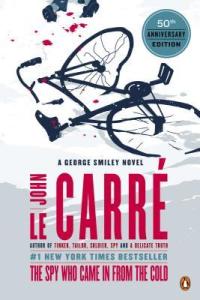John le Carré’s The Spy Who Came in From the Cold
A literary classic as thrilling as any airport paperback

I moved to Washington D.C. shortly after my college graduation. Having studied literature, attempted to write fiction, and reported for the school paper, I landed a job at The Atlantic during the run-up to the Iraq War, and quickly found myself in over my head in politics and foreign affairs.
At dinner at the magazine owner’s home on Embassy Row, I sat between a former CIA director and a Times columnist as they debated the new imperialism. At drinks with another reporter, “Chalabi’s guys” showed up. And from our maze of cubicles in the Watergate building, a fellow staffer (now an editor at this magazine) took off for Istanbul carrying body armor and $10,000 in small bills to resupply our Baghdad correspondent.
The material and my imagination quickly overflowed the squibs I was writing for the magazine, so I put it all into fiction. I was writing and rewriting endlessly, stuck, searching for a way to triangulate between the literary writing I had studied, the real-life intrigue all around me, and the thriller novels and blockbusters I had grown up on.
Enter John le Carré’s The Spy Who Came in From the Cold (1963), as moving and brilliant a novel as any of the classics I had read and as propulsive and gripping as any airport paperback. I never imagined a writer could have it all in one book: a perfect machine of fast pace, twists, and suspense; a profound tragedy as hard and uncompromising as the realist novels we’d pored over in my college seminars; and at the height of the Cold War, a shockingly clear-eyed account of the moral compromises built into the work of intelligence agencies, both East and West. Oh, and a tear-wringing love story, all in a mere 256 pages.
Le Carré led me to others who bridged the popular/literary divide—Graham Greene, Raymond Chandler, Dashiell Hammett, William Goldman—and the realization, not particularly earth-shattering but a breakthrough for me at the time, that there is no line between art and pop. There are only good stories.

